Sustainable Hotel Environment: Luxury and Green Compatibility Report
VerifiedAdded on 2023/01/04
|9
|2969
|67
Report
AI Summary
This report examines the evolving relationship between luxury and sustainability within the hotel industry. It explores the concept of luxury green hotels, highlighting the drivers for adopting eco-friendly practices, such as environmental concerns and corporate social responsibility. The report investigates how various hotels are implementing sustainable initiatives, from reducing resource consumption to promoting farm-to-table dining and waste reduction. Several examples of luxury green hotels, including The Andaman, Daintree Eco Lodge & Spa, and Algonquin Eco-lodge, are presented to illustrate successful integration of luxury and sustainability. The report concludes with recommendations for hotels to enhance their sustainability efforts, emphasizing the importance of water and energy conservation, waste reduction, staff involvement, and guest feedback. The report argues that while luxury and green have been perceived as incompatible, recent trends demonstrate that they can be successfully integrated, leading to both environmental benefits and enhanced customer experiences.

Running Head: SUSTAINABLE HOTEL ENVIRONMENT
SUSTAINABLE HOTEL ENVIRONMENT
SUSTAINABLE HOTEL ENVIRONMENT
Paraphrase This Document
Need a fresh take? Get an instant paraphrase of this document with our AI Paraphraser
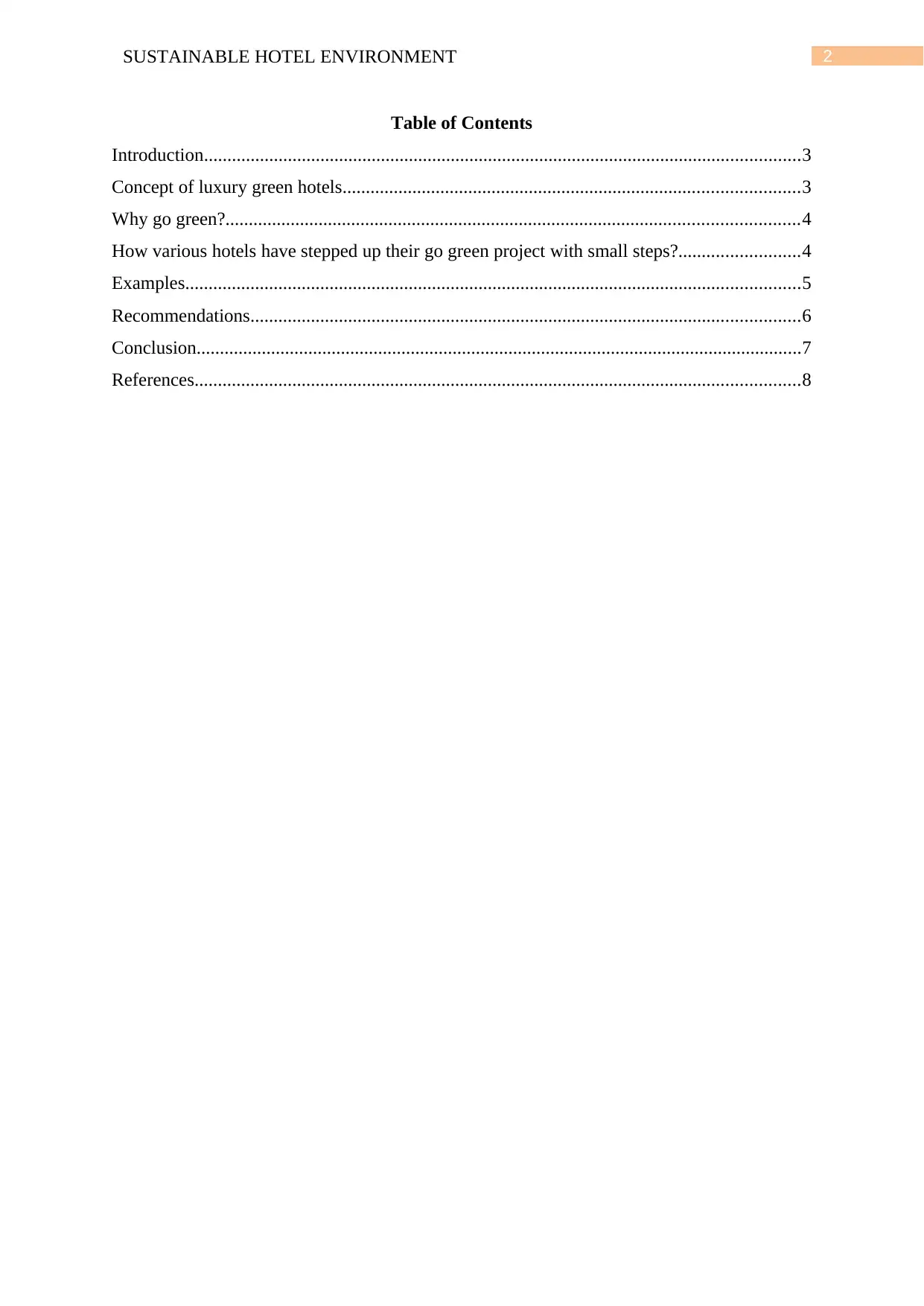
2SUSTAINABLE HOTEL ENVIRONMENT
Table of Contents
Introduction................................................................................................................................3
Concept of luxury green hotels..................................................................................................3
Why go green?...........................................................................................................................4
How various hotels have stepped up their go green project with small steps?..........................4
Examples....................................................................................................................................5
Recommendations......................................................................................................................6
Conclusion..................................................................................................................................7
References..................................................................................................................................8
Table of Contents
Introduction................................................................................................................................3
Concept of luxury green hotels..................................................................................................3
Why go green?...........................................................................................................................4
How various hotels have stepped up their go green project with small steps?..........................4
Examples....................................................................................................................................5
Recommendations......................................................................................................................6
Conclusion..................................................................................................................................7
References..................................................................................................................................8
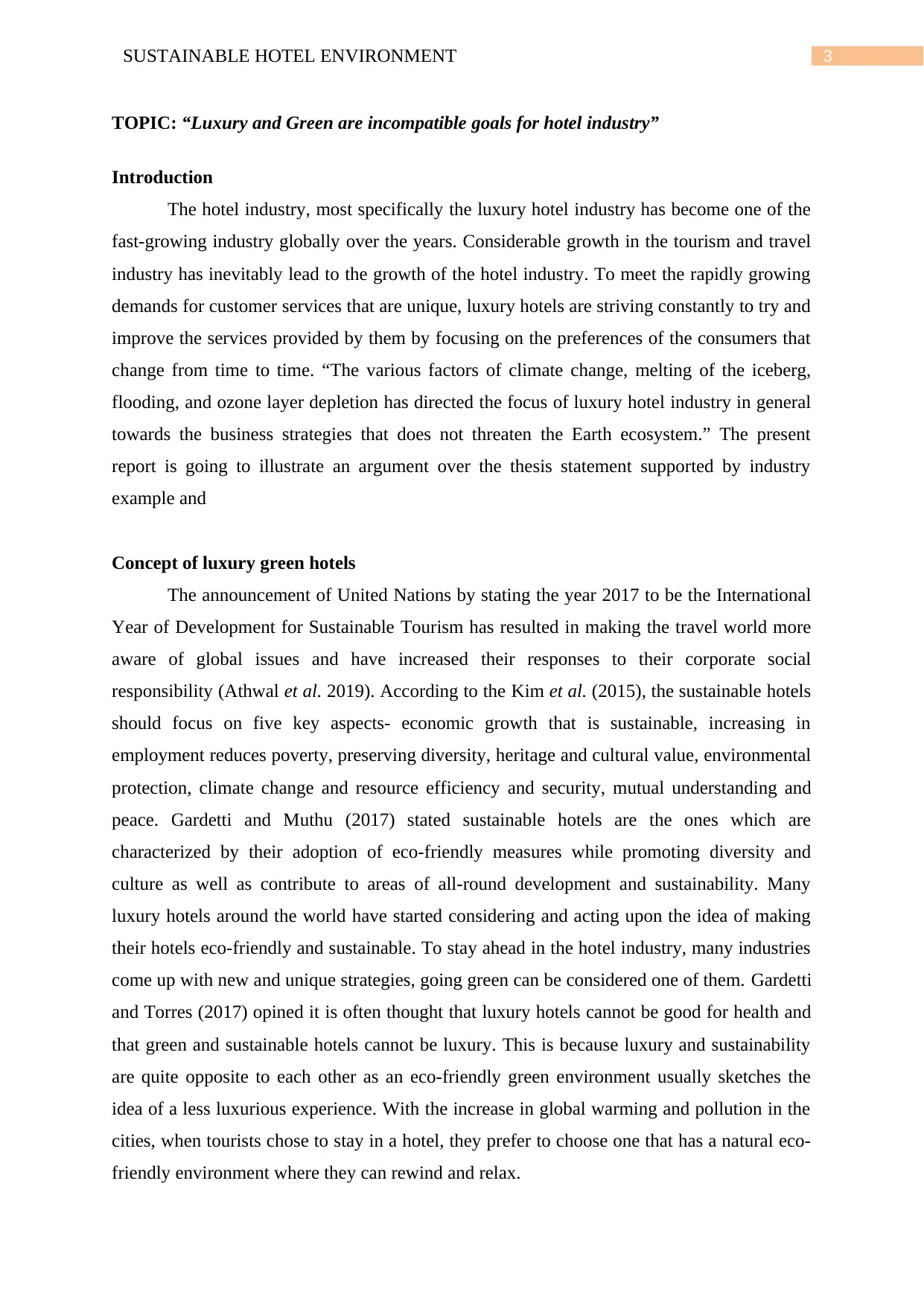
3SUSTAINABLE HOTEL ENVIRONMENT
TOPIC: “Luxury and Green are incompatible goals for hotel industry”
Introduction
The hotel industry, most specifically the luxury hotel industry has become one of the
fast-growing industry globally over the years. Considerable growth in the tourism and travel
industry has inevitably lead to the growth of the hotel industry. To meet the rapidly growing
demands for customer services that are unique, luxury hotels are striving constantly to try and
improve the services provided by them by focusing on the preferences of the consumers that
change from time to time. “The various factors of climate change, melting of the iceberg,
flooding, and ozone layer depletion has directed the focus of luxury hotel industry in general
towards the business strategies that does not threaten the Earth ecosystem.” The present
report is going to illustrate an argument over the thesis statement supported by industry
example and
Concept of luxury green hotels
The announcement of United Nations by stating the year 2017 to be the International
Year of Development for Sustainable Tourism has resulted in making the travel world more
aware of global issues and have increased their responses to their corporate social
responsibility (Athwal et al. 2019). According to the Kim et al. (2015), the sustainable hotels
should focus on five key aspects- economic growth that is sustainable, increasing in
employment reduces poverty, preserving diversity, heritage and cultural value, environmental
protection, climate change and resource efficiency and security, mutual understanding and
peace. Gardetti and Muthu (2017) stated sustainable hotels are the ones which are
characterized by their adoption of eco-friendly measures while promoting diversity and
culture as well as contribute to areas of all-round development and sustainability. Many
luxury hotels around the world have started considering and acting upon the idea of making
their hotels eco-friendly and sustainable. To stay ahead in the hotel industry, many industries
come up with new and unique strategies, going green can be considered one of them. Gardetti
and Torres (2017) opined it is often thought that luxury hotels cannot be good for health and
that green and sustainable hotels cannot be luxury. This is because luxury and sustainability
are quite opposite to each other as an eco-friendly green environment usually sketches the
idea of a less luxurious experience. With the increase in global warming and pollution in the
cities, when tourists chose to stay in a hotel, they prefer to choose one that has a natural eco-
friendly environment where they can rewind and relax.
TOPIC: “Luxury and Green are incompatible goals for hotel industry”
Introduction
The hotel industry, most specifically the luxury hotel industry has become one of the
fast-growing industry globally over the years. Considerable growth in the tourism and travel
industry has inevitably lead to the growth of the hotel industry. To meet the rapidly growing
demands for customer services that are unique, luxury hotels are striving constantly to try and
improve the services provided by them by focusing on the preferences of the consumers that
change from time to time. “The various factors of climate change, melting of the iceberg,
flooding, and ozone layer depletion has directed the focus of luxury hotel industry in general
towards the business strategies that does not threaten the Earth ecosystem.” The present
report is going to illustrate an argument over the thesis statement supported by industry
example and
Concept of luxury green hotels
The announcement of United Nations by stating the year 2017 to be the International
Year of Development for Sustainable Tourism has resulted in making the travel world more
aware of global issues and have increased their responses to their corporate social
responsibility (Athwal et al. 2019). According to the Kim et al. (2015), the sustainable hotels
should focus on five key aspects- economic growth that is sustainable, increasing in
employment reduces poverty, preserving diversity, heritage and cultural value, environmental
protection, climate change and resource efficiency and security, mutual understanding and
peace. Gardetti and Muthu (2017) stated sustainable hotels are the ones which are
characterized by their adoption of eco-friendly measures while promoting diversity and
culture as well as contribute to areas of all-round development and sustainability. Many
luxury hotels around the world have started considering and acting upon the idea of making
their hotels eco-friendly and sustainable. To stay ahead in the hotel industry, many industries
come up with new and unique strategies, going green can be considered one of them. Gardetti
and Torres (2017) opined it is often thought that luxury hotels cannot be good for health and
that green and sustainable hotels cannot be luxury. This is because luxury and sustainability
are quite opposite to each other as an eco-friendly green environment usually sketches the
idea of a less luxurious experience. With the increase in global warming and pollution in the
cities, when tourists chose to stay in a hotel, they prefer to choose one that has a natural eco-
friendly environment where they can rewind and relax.
⊘ This is a preview!⊘
Do you want full access?
Subscribe today to unlock all pages.

Trusted by 1+ million students worldwide
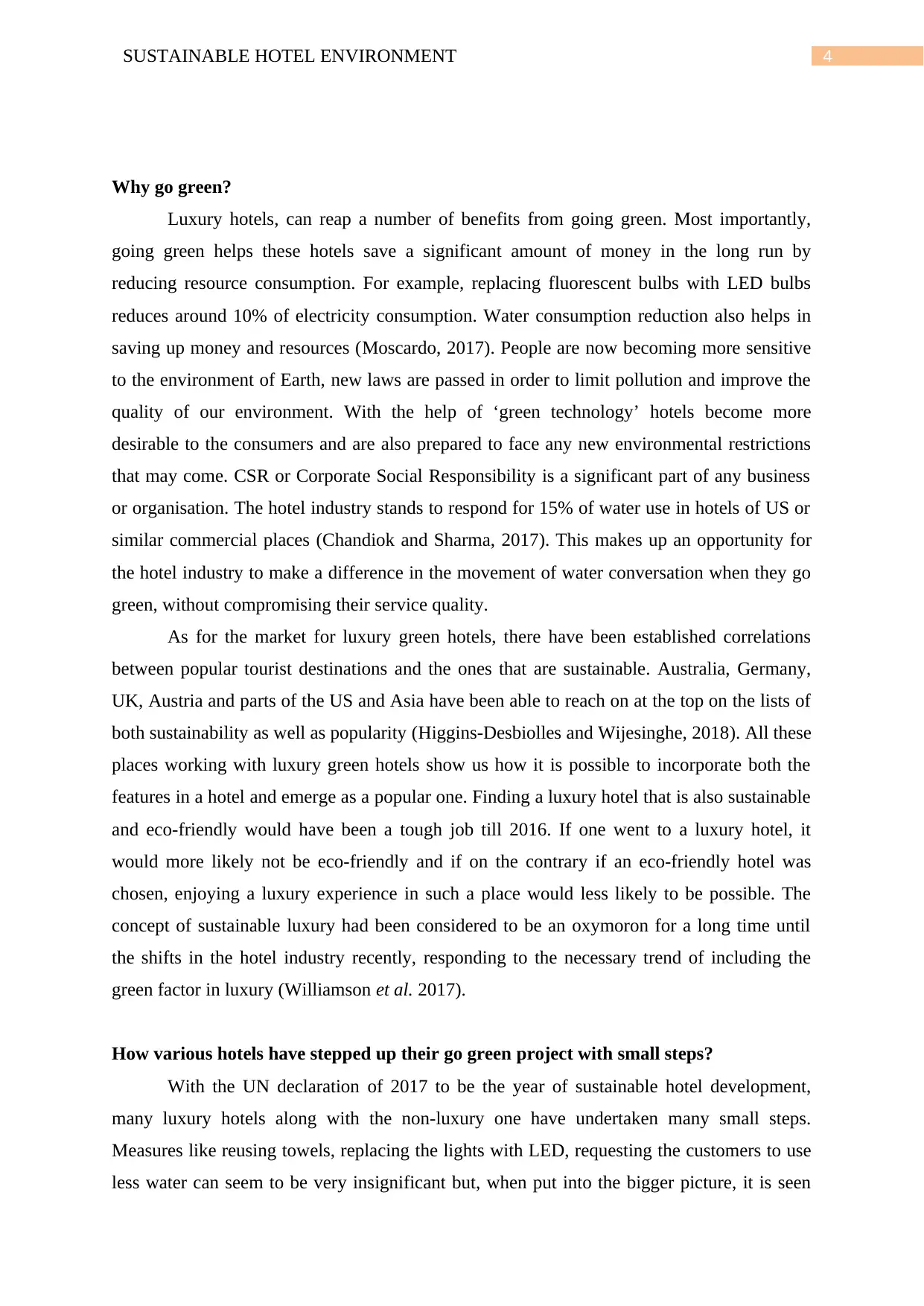
4SUSTAINABLE HOTEL ENVIRONMENT
Why go green?
Luxury hotels, can reap a number of benefits from going green. Most importantly,
going green helps these hotels save a significant amount of money in the long run by
reducing resource consumption. For example, replacing fluorescent bulbs with LED bulbs
reduces around 10% of electricity consumption. Water consumption reduction also helps in
saving up money and resources (Moscardo, 2017). People are now becoming more sensitive
to the environment of Earth, new laws are passed in order to limit pollution and improve the
quality of our environment. With the help of ‘green technology’ hotels become more
desirable to the consumers and are also prepared to face any new environmental restrictions
that may come. CSR or Corporate Social Responsibility is a significant part of any business
or organisation. The hotel industry stands to respond for 15% of water use in hotels of US or
similar commercial places (Chandiok and Sharma, 2017). This makes up an opportunity for
the hotel industry to make a difference in the movement of water conversation when they go
green, without compromising their service quality.
As for the market for luxury green hotels, there have been established correlations
between popular tourist destinations and the ones that are sustainable. Australia, Germany,
UK, Austria and parts of the US and Asia have been able to reach on at the top on the lists of
both sustainability as well as popularity (Higgins-Desbiolles and Wijesinghe, 2018). All these
places working with luxury green hotels show us how it is possible to incorporate both the
features in a hotel and emerge as a popular one. Finding a luxury hotel that is also sustainable
and eco-friendly would have been a tough job till 2016. If one went to a luxury hotel, it
would more likely not be eco-friendly and if on the contrary if an eco-friendly hotel was
chosen, enjoying a luxury experience in such a place would less likely to be possible. The
concept of sustainable luxury had been considered to be an oxymoron for a long time until
the shifts in the hotel industry recently, responding to the necessary trend of including the
green factor in luxury (Williamson et al. 2017).
How various hotels have stepped up their go green project with small steps?
With the UN declaration of 2017 to be the year of sustainable hotel development,
many luxury hotels along with the non-luxury one have undertaken many small steps.
Measures like reusing towels, replacing the lights with LED, requesting the customers to use
less water can seem to be very insignificant but, when put into the bigger picture, it is seen
Why go green?
Luxury hotels, can reap a number of benefits from going green. Most importantly,
going green helps these hotels save a significant amount of money in the long run by
reducing resource consumption. For example, replacing fluorescent bulbs with LED bulbs
reduces around 10% of electricity consumption. Water consumption reduction also helps in
saving up money and resources (Moscardo, 2017). People are now becoming more sensitive
to the environment of Earth, new laws are passed in order to limit pollution and improve the
quality of our environment. With the help of ‘green technology’ hotels become more
desirable to the consumers and are also prepared to face any new environmental restrictions
that may come. CSR or Corporate Social Responsibility is a significant part of any business
or organisation. The hotel industry stands to respond for 15% of water use in hotels of US or
similar commercial places (Chandiok and Sharma, 2017). This makes up an opportunity for
the hotel industry to make a difference in the movement of water conversation when they go
green, without compromising their service quality.
As for the market for luxury green hotels, there have been established correlations
between popular tourist destinations and the ones that are sustainable. Australia, Germany,
UK, Austria and parts of the US and Asia have been able to reach on at the top on the lists of
both sustainability as well as popularity (Higgins-Desbiolles and Wijesinghe, 2018). All these
places working with luxury green hotels show us how it is possible to incorporate both the
features in a hotel and emerge as a popular one. Finding a luxury hotel that is also sustainable
and eco-friendly would have been a tough job till 2016. If one went to a luxury hotel, it
would more likely not be eco-friendly and if on the contrary if an eco-friendly hotel was
chosen, enjoying a luxury experience in such a place would less likely to be possible. The
concept of sustainable luxury had been considered to be an oxymoron for a long time until
the shifts in the hotel industry recently, responding to the necessary trend of including the
green factor in luxury (Williamson et al. 2017).
How various hotels have stepped up their go green project with small steps?
With the UN declaration of 2017 to be the year of sustainable hotel development,
many luxury hotels along with the non-luxury one have undertaken many small steps.
Measures like reusing towels, replacing the lights with LED, requesting the customers to use
less water can seem to be very insignificant but, when put into the bigger picture, it is seen
Paraphrase This Document
Need a fresh take? Get an instant paraphrase of this document with our AI Paraphraser
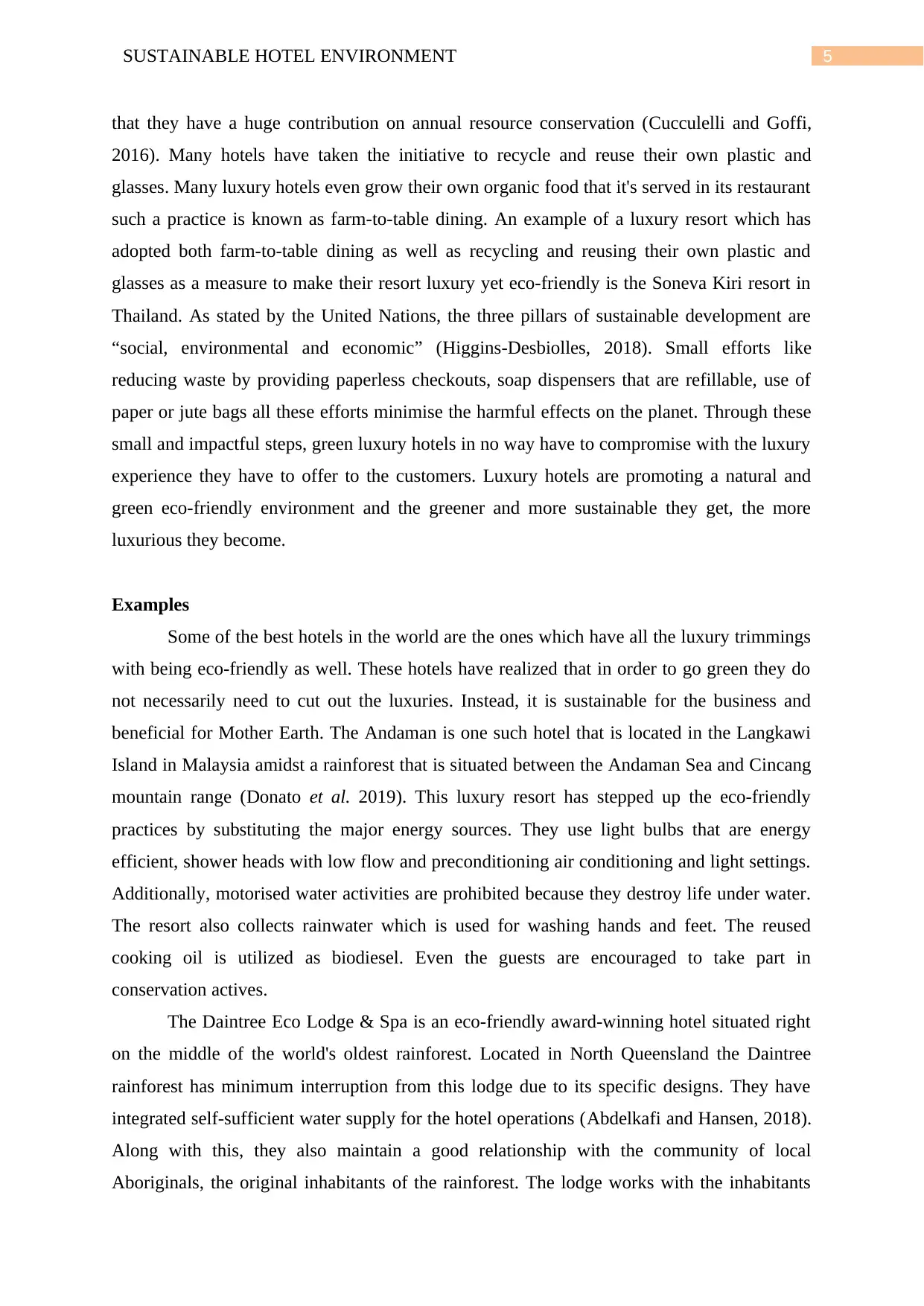
5SUSTAINABLE HOTEL ENVIRONMENT
that they have a huge contribution on annual resource conservation (Cucculelli and Goffi,
2016). Many hotels have taken the initiative to recycle and reuse their own plastic and
glasses. Many luxury hotels even grow their own organic food that it's served in its restaurant
such a practice is known as farm-to-table dining. An example of a luxury resort which has
adopted both farm-to-table dining as well as recycling and reusing their own plastic and
glasses as a measure to make their resort luxury yet eco-friendly is the Soneva Kiri resort in
Thailand. As stated by the United Nations, the three pillars of sustainable development are
“social, environmental and economic” (Higgins-Desbiolles, 2018). Small efforts like
reducing waste by providing paperless checkouts, soap dispensers that are refillable, use of
paper or jute bags all these efforts minimise the harmful effects on the planet. Through these
small and impactful steps, green luxury hotels in no way have to compromise with the luxury
experience they have to offer to the customers. Luxury hotels are promoting a natural and
green eco-friendly environment and the greener and more sustainable they get, the more
luxurious they become.
Examples
Some of the best hotels in the world are the ones which have all the luxury trimmings
with being eco-friendly as well. These hotels have realized that in order to go green they do
not necessarily need to cut out the luxuries. Instead, it is sustainable for the business and
beneficial for Mother Earth. The Andaman is one such hotel that is located in the Langkawi
Island in Malaysia amidst a rainforest that is situated between the Andaman Sea and Cincang
mountain range (Donato et al. 2019). This luxury resort has stepped up the eco-friendly
practices by substituting the major energy sources. They use light bulbs that are energy
efficient, shower heads with low flow and preconditioning air conditioning and light settings.
Additionally, motorised water activities are prohibited because they destroy life under water.
The resort also collects rainwater which is used for washing hands and feet. The reused
cooking oil is utilized as biodiesel. Even the guests are encouraged to take part in
conservation actives.
The Daintree Eco Lodge & Spa is an eco-friendly award-winning hotel situated right
on the middle of the world's oldest rainforest. Located in North Queensland the Daintree
rainforest has minimum interruption from this lodge due to its specific designs. They have
integrated self-sufficient water supply for the hotel operations (Abdelkafi and Hansen, 2018).
Along with this, they also maintain a good relationship with the community of local
Aboriginals, the original inhabitants of the rainforest. The lodge works with the inhabitants
that they have a huge contribution on annual resource conservation (Cucculelli and Goffi,
2016). Many hotels have taken the initiative to recycle and reuse their own plastic and
glasses. Many luxury hotels even grow their own organic food that it's served in its restaurant
such a practice is known as farm-to-table dining. An example of a luxury resort which has
adopted both farm-to-table dining as well as recycling and reusing their own plastic and
glasses as a measure to make their resort luxury yet eco-friendly is the Soneva Kiri resort in
Thailand. As stated by the United Nations, the three pillars of sustainable development are
“social, environmental and economic” (Higgins-Desbiolles, 2018). Small efforts like
reducing waste by providing paperless checkouts, soap dispensers that are refillable, use of
paper or jute bags all these efforts minimise the harmful effects on the planet. Through these
small and impactful steps, green luxury hotels in no way have to compromise with the luxury
experience they have to offer to the customers. Luxury hotels are promoting a natural and
green eco-friendly environment and the greener and more sustainable they get, the more
luxurious they become.
Examples
Some of the best hotels in the world are the ones which have all the luxury trimmings
with being eco-friendly as well. These hotels have realized that in order to go green they do
not necessarily need to cut out the luxuries. Instead, it is sustainable for the business and
beneficial for Mother Earth. The Andaman is one such hotel that is located in the Langkawi
Island in Malaysia amidst a rainforest that is situated between the Andaman Sea and Cincang
mountain range (Donato et al. 2019). This luxury resort has stepped up the eco-friendly
practices by substituting the major energy sources. They use light bulbs that are energy
efficient, shower heads with low flow and preconditioning air conditioning and light settings.
Additionally, motorised water activities are prohibited because they destroy life under water.
The resort also collects rainwater which is used for washing hands and feet. The reused
cooking oil is utilized as biodiesel. Even the guests are encouraged to take part in
conservation actives.
The Daintree Eco Lodge & Spa is an eco-friendly award-winning hotel situated right
on the middle of the world's oldest rainforest. Located in North Queensland the Daintree
rainforest has minimum interruption from this lodge due to its specific designs. They have
integrated self-sufficient water supply for the hotel operations (Abdelkafi and Hansen, 2018).
Along with this, they also maintain a good relationship with the community of local
Aboriginals, the original inhabitants of the rainforest. The lodge works with the inhabitants
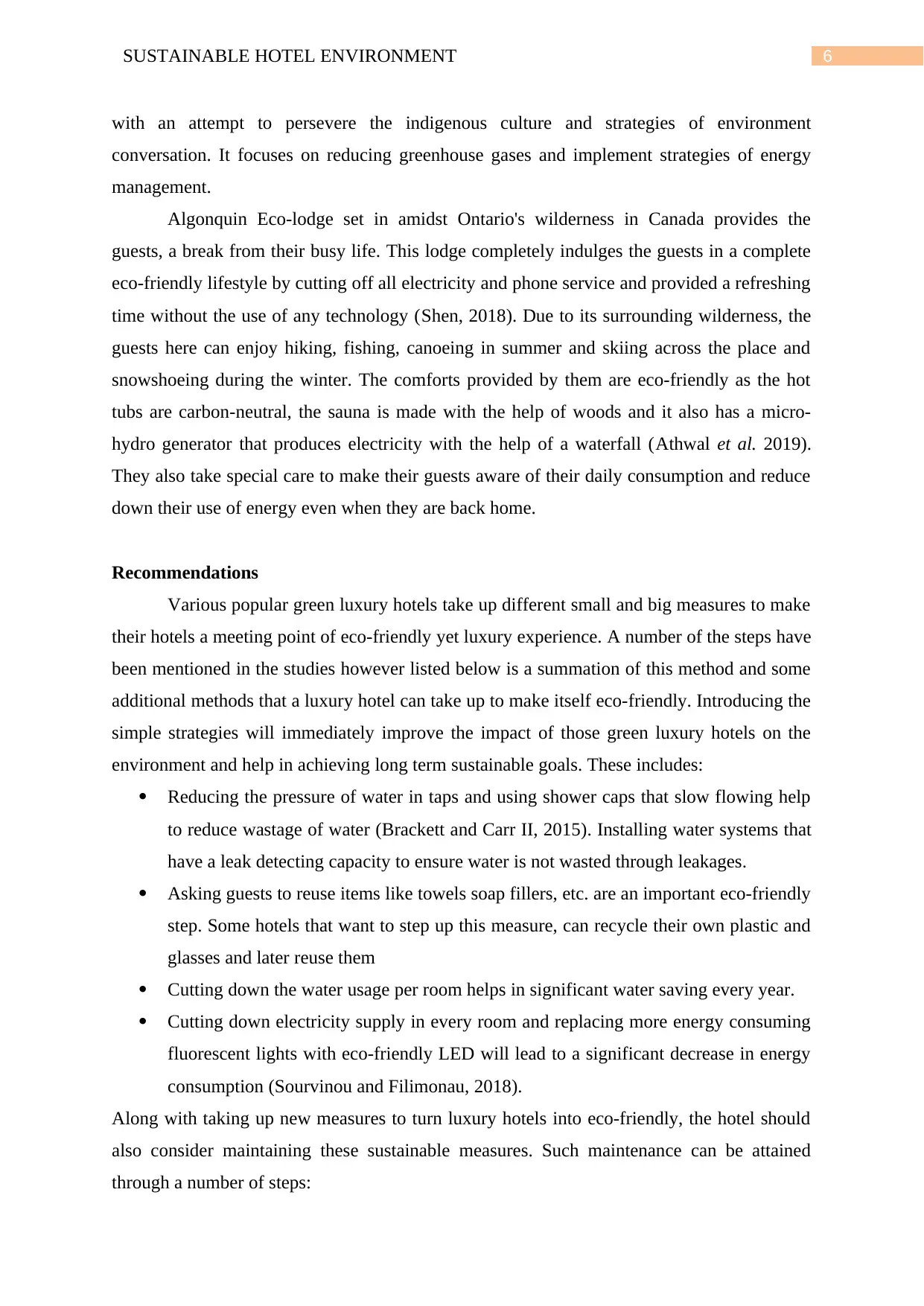
6SUSTAINABLE HOTEL ENVIRONMENT
with an attempt to persevere the indigenous culture and strategies of environment
conversation. It focuses on reducing greenhouse gases and implement strategies of energy
management.
Algonquin Eco-lodge set in amidst Ontario's wilderness in Canada provides the
guests, a break from their busy life. This lodge completely indulges the guests in a complete
eco-friendly lifestyle by cutting off all electricity and phone service and provided a refreshing
time without the use of any technology (Shen, 2018). Due to its surrounding wilderness, the
guests here can enjoy hiking, fishing, canoeing in summer and skiing across the place and
snowshoeing during the winter. The comforts provided by them are eco-friendly as the hot
tubs are carbon-neutral, the sauna is made with the help of woods and it also has a micro-
hydro generator that produces electricity with the help of a waterfall (Athwal et al. 2019).
They also take special care to make their guests aware of their daily consumption and reduce
down their use of energy even when they are back home.
Recommendations
Various popular green luxury hotels take up different small and big measures to make
their hotels a meeting point of eco-friendly yet luxury experience. A number of the steps have
been mentioned in the studies however listed below is a summation of this method and some
additional methods that a luxury hotel can take up to make itself eco-friendly. Introducing the
simple strategies will immediately improve the impact of those green luxury hotels on the
environment and help in achieving long term sustainable goals. These includes:
Reducing the pressure of water in taps and using shower caps that slow flowing help
to reduce wastage of water (Brackett and Carr II, 2015). Installing water systems that
have a leak detecting capacity to ensure water is not wasted through leakages.
Asking guests to reuse items like towels soap fillers, etc. are an important eco-friendly
step. Some hotels that want to step up this measure, can recycle their own plastic and
glasses and later reuse them
Cutting down the water usage per room helps in significant water saving every year.
Cutting down electricity supply in every room and replacing more energy consuming
fluorescent lights with eco-friendly LED will lead to a significant decrease in energy
consumption (Sourvinou and Filimonau, 2018).
Along with taking up new measures to turn luxury hotels into eco-friendly, the hotel should
also consider maintaining these sustainable measures. Such maintenance can be attained
through a number of steps:
with an attempt to persevere the indigenous culture and strategies of environment
conversation. It focuses on reducing greenhouse gases and implement strategies of energy
management.
Algonquin Eco-lodge set in amidst Ontario's wilderness in Canada provides the
guests, a break from their busy life. This lodge completely indulges the guests in a complete
eco-friendly lifestyle by cutting off all electricity and phone service and provided a refreshing
time without the use of any technology (Shen, 2018). Due to its surrounding wilderness, the
guests here can enjoy hiking, fishing, canoeing in summer and skiing across the place and
snowshoeing during the winter. The comforts provided by them are eco-friendly as the hot
tubs are carbon-neutral, the sauna is made with the help of woods and it also has a micro-
hydro generator that produces electricity with the help of a waterfall (Athwal et al. 2019).
They also take special care to make their guests aware of their daily consumption and reduce
down their use of energy even when they are back home.
Recommendations
Various popular green luxury hotels take up different small and big measures to make
their hotels a meeting point of eco-friendly yet luxury experience. A number of the steps have
been mentioned in the studies however listed below is a summation of this method and some
additional methods that a luxury hotel can take up to make itself eco-friendly. Introducing the
simple strategies will immediately improve the impact of those green luxury hotels on the
environment and help in achieving long term sustainable goals. These includes:
Reducing the pressure of water in taps and using shower caps that slow flowing help
to reduce wastage of water (Brackett and Carr II, 2015). Installing water systems that
have a leak detecting capacity to ensure water is not wasted through leakages.
Asking guests to reuse items like towels soap fillers, etc. are an important eco-friendly
step. Some hotels that want to step up this measure, can recycle their own plastic and
glasses and later reuse them
Cutting down the water usage per room helps in significant water saving every year.
Cutting down electricity supply in every room and replacing more energy consuming
fluorescent lights with eco-friendly LED will lead to a significant decrease in energy
consumption (Sourvinou and Filimonau, 2018).
Along with taking up new measures to turn luxury hotels into eco-friendly, the hotel should
also consider maintaining these sustainable measures. Such maintenance can be attained
through a number of steps:
⊘ This is a preview!⊘
Do you want full access?
Subscribe today to unlock all pages.

Trusted by 1+ million students worldwide
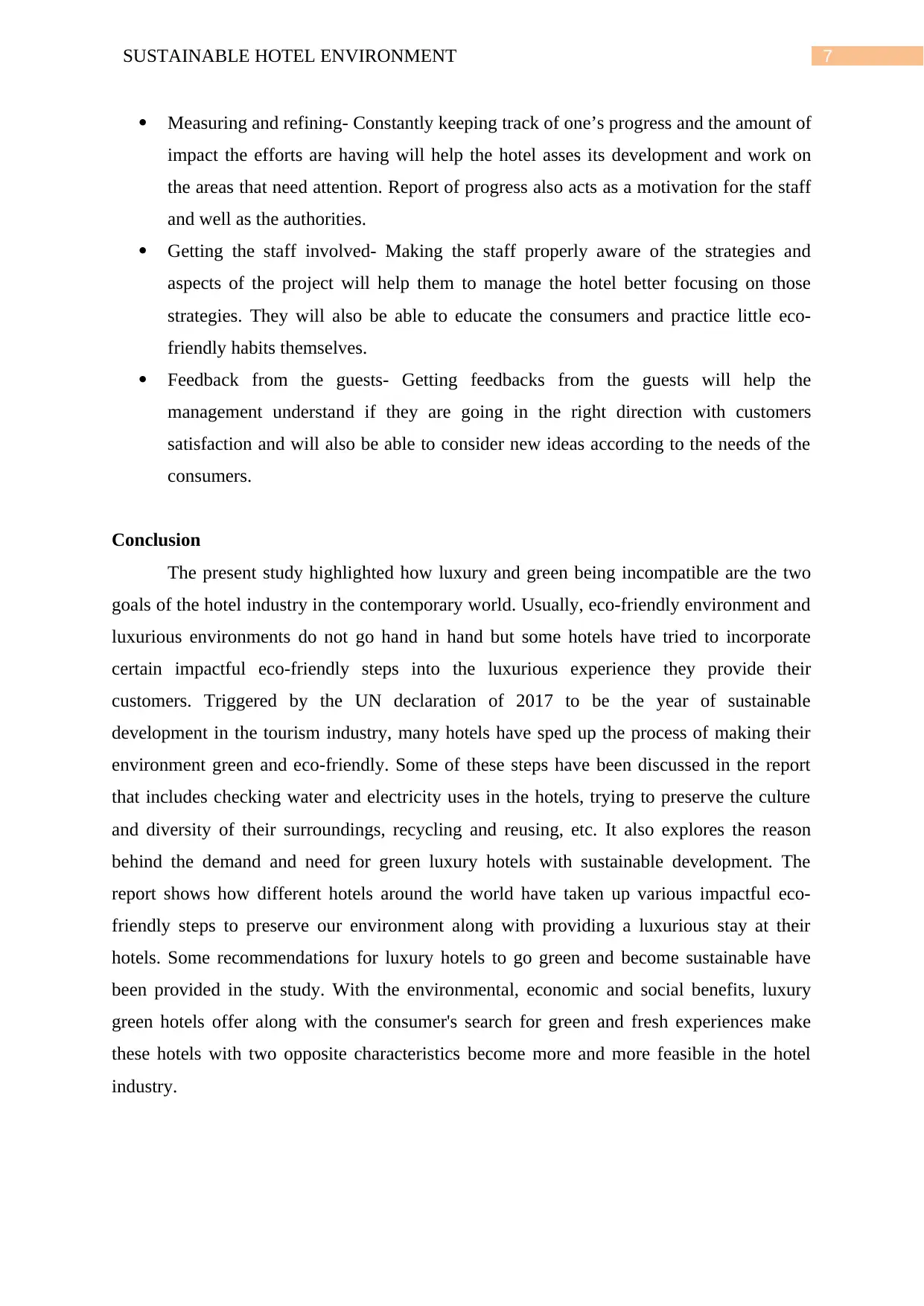
7SUSTAINABLE HOTEL ENVIRONMENT
Measuring and refining- Constantly keeping track of one’s progress and the amount of
impact the efforts are having will help the hotel asses its development and work on
the areas that need attention. Report of progress also acts as a motivation for the staff
and well as the authorities.
Getting the staff involved- Making the staff properly aware of the strategies and
aspects of the project will help them to manage the hotel better focusing on those
strategies. They will also be able to educate the consumers and practice little eco-
friendly habits themselves.
Feedback from the guests- Getting feedbacks from the guests will help the
management understand if they are going in the right direction with customers
satisfaction and will also be able to consider new ideas according to the needs of the
consumers.
Conclusion
The present study highlighted how luxury and green being incompatible are the two
goals of the hotel industry in the contemporary world. Usually, eco-friendly environment and
luxurious environments do not go hand in hand but some hotels have tried to incorporate
certain impactful eco-friendly steps into the luxurious experience they provide their
customers. Triggered by the UN declaration of 2017 to be the year of sustainable
development in the tourism industry, many hotels have sped up the process of making their
environment green and eco-friendly. Some of these steps have been discussed in the report
that includes checking water and electricity uses in the hotels, trying to preserve the culture
and diversity of their surroundings, recycling and reusing, etc. It also explores the reason
behind the demand and need for green luxury hotels with sustainable development. The
report shows how different hotels around the world have taken up various impactful eco-
friendly steps to preserve our environment along with providing a luxurious stay at their
hotels. Some recommendations for luxury hotels to go green and become sustainable have
been provided in the study. With the environmental, economic and social benefits, luxury
green hotels offer along with the consumer's search for green and fresh experiences make
these hotels with two opposite characteristics become more and more feasible in the hotel
industry.
Measuring and refining- Constantly keeping track of one’s progress and the amount of
impact the efforts are having will help the hotel asses its development and work on
the areas that need attention. Report of progress also acts as a motivation for the staff
and well as the authorities.
Getting the staff involved- Making the staff properly aware of the strategies and
aspects of the project will help them to manage the hotel better focusing on those
strategies. They will also be able to educate the consumers and practice little eco-
friendly habits themselves.
Feedback from the guests- Getting feedbacks from the guests will help the
management understand if they are going in the right direction with customers
satisfaction and will also be able to consider new ideas according to the needs of the
consumers.
Conclusion
The present study highlighted how luxury and green being incompatible are the two
goals of the hotel industry in the contemporary world. Usually, eco-friendly environment and
luxurious environments do not go hand in hand but some hotels have tried to incorporate
certain impactful eco-friendly steps into the luxurious experience they provide their
customers. Triggered by the UN declaration of 2017 to be the year of sustainable
development in the tourism industry, many hotels have sped up the process of making their
environment green and eco-friendly. Some of these steps have been discussed in the report
that includes checking water and electricity uses in the hotels, trying to preserve the culture
and diversity of their surroundings, recycling and reusing, etc. It also explores the reason
behind the demand and need for green luxury hotels with sustainable development. The
report shows how different hotels around the world have taken up various impactful eco-
friendly steps to preserve our environment along with providing a luxurious stay at their
hotels. Some recommendations for luxury hotels to go green and become sustainable have
been provided in the study. With the environmental, economic and social benefits, luxury
green hotels offer along with the consumer's search for green and fresh experiences make
these hotels with two opposite characteristics become more and more feasible in the hotel
industry.
Paraphrase This Document
Need a fresh take? Get an instant paraphrase of this document with our AI Paraphraser
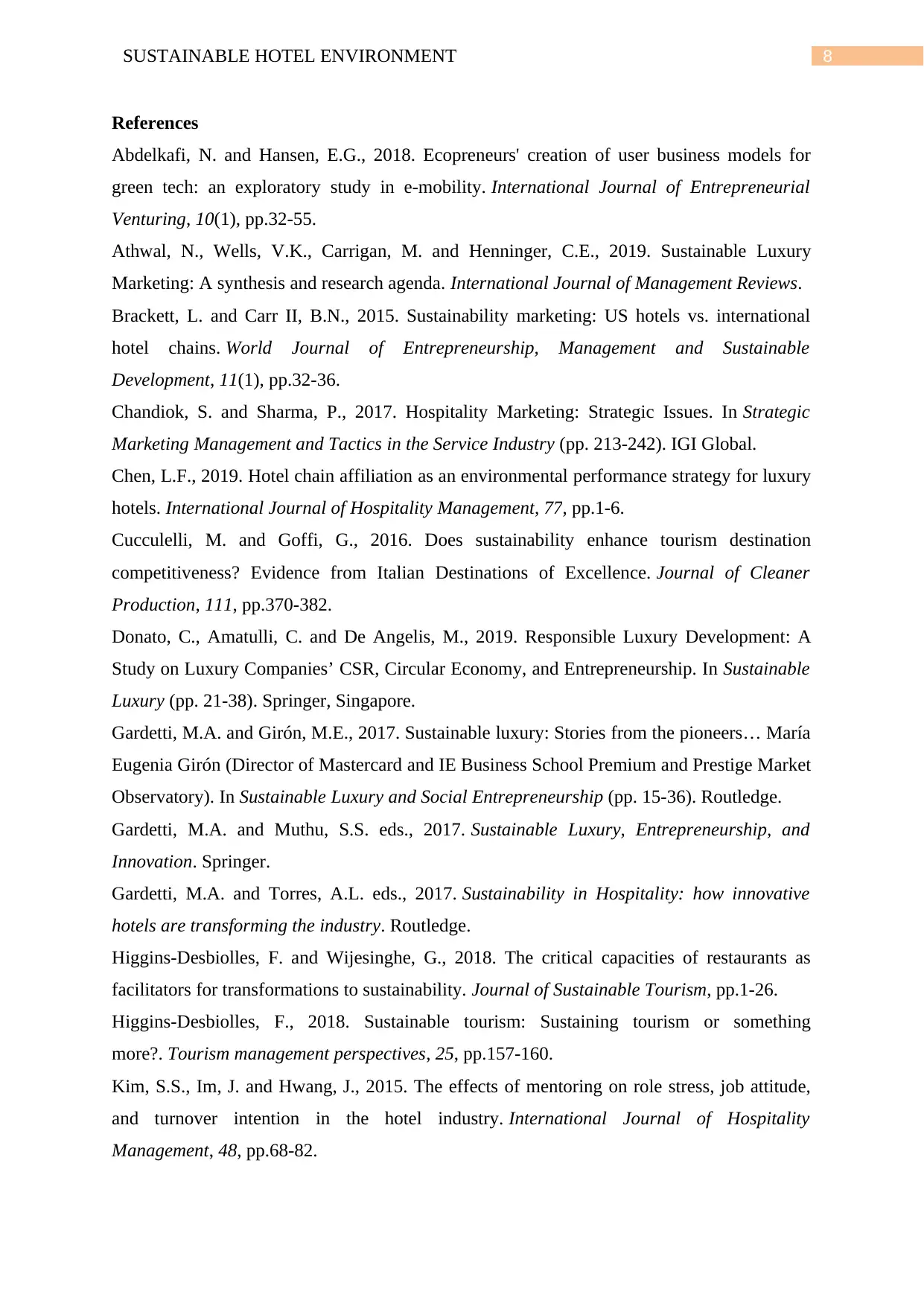
8SUSTAINABLE HOTEL ENVIRONMENT
References
Abdelkafi, N. and Hansen, E.G., 2018. Ecopreneurs' creation of user business models for
green tech: an exploratory study in e-mobility. International Journal of Entrepreneurial
Venturing, 10(1), pp.32-55.
Athwal, N., Wells, V.K., Carrigan, M. and Henninger, C.E., 2019. Sustainable Luxury
Marketing: A synthesis and research agenda. International Journal of Management Reviews.
Brackett, L. and Carr II, B.N., 2015. Sustainability marketing: US hotels vs. international
hotel chains. World Journal of Entrepreneurship, Management and Sustainable
Development, 11(1), pp.32-36.
Chandiok, S. and Sharma, P., 2017. Hospitality Marketing: Strategic Issues. In Strategic
Marketing Management and Tactics in the Service Industry (pp. 213-242). IGI Global.
Chen, L.F., 2019. Hotel chain affiliation as an environmental performance strategy for luxury
hotels. International Journal of Hospitality Management, 77, pp.1-6.
Cucculelli, M. and Goffi, G., 2016. Does sustainability enhance tourism destination
competitiveness? Evidence from Italian Destinations of Excellence. Journal of Cleaner
Production, 111, pp.370-382.
Donato, C., Amatulli, C. and De Angelis, M., 2019. Responsible Luxury Development: A
Study on Luxury Companies’ CSR, Circular Economy, and Entrepreneurship. In Sustainable
Luxury (pp. 21-38). Springer, Singapore.
Gardetti, M.A. and Girón, M.E., 2017. Sustainable luxury: Stories from the pioneers… María
Eugenia Girón (Director of Mastercard and IE Business School Premium and Prestige Market
Observatory). In Sustainable Luxury and Social Entrepreneurship (pp. 15-36). Routledge.
Gardetti, M.A. and Muthu, S.S. eds., 2017. Sustainable Luxury, Entrepreneurship, and
Innovation. Springer.
Gardetti, M.A. and Torres, A.L. eds., 2017. Sustainability in Hospitality: how innovative
hotels are transforming the industry. Routledge.
Higgins-Desbiolles, F. and Wijesinghe, G., 2018. The critical capacities of restaurants as
facilitators for transformations to sustainability. Journal of Sustainable Tourism, pp.1-26.
Higgins-Desbiolles, F., 2018. Sustainable tourism: Sustaining tourism or something
more?. Tourism management perspectives, 25, pp.157-160.
Kim, S.S., Im, J. and Hwang, J., 2015. The effects of mentoring on role stress, job attitude,
and turnover intention in the hotel industry. International Journal of Hospitality
Management, 48, pp.68-82.
References
Abdelkafi, N. and Hansen, E.G., 2018. Ecopreneurs' creation of user business models for
green tech: an exploratory study in e-mobility. International Journal of Entrepreneurial
Venturing, 10(1), pp.32-55.
Athwal, N., Wells, V.K., Carrigan, M. and Henninger, C.E., 2019. Sustainable Luxury
Marketing: A synthesis and research agenda. International Journal of Management Reviews.
Brackett, L. and Carr II, B.N., 2015. Sustainability marketing: US hotels vs. international
hotel chains. World Journal of Entrepreneurship, Management and Sustainable
Development, 11(1), pp.32-36.
Chandiok, S. and Sharma, P., 2017. Hospitality Marketing: Strategic Issues. In Strategic
Marketing Management and Tactics in the Service Industry (pp. 213-242). IGI Global.
Chen, L.F., 2019. Hotel chain affiliation as an environmental performance strategy for luxury
hotels. International Journal of Hospitality Management, 77, pp.1-6.
Cucculelli, M. and Goffi, G., 2016. Does sustainability enhance tourism destination
competitiveness? Evidence from Italian Destinations of Excellence. Journal of Cleaner
Production, 111, pp.370-382.
Donato, C., Amatulli, C. and De Angelis, M., 2019. Responsible Luxury Development: A
Study on Luxury Companies’ CSR, Circular Economy, and Entrepreneurship. In Sustainable
Luxury (pp. 21-38). Springer, Singapore.
Gardetti, M.A. and Girón, M.E., 2017. Sustainable luxury: Stories from the pioneers… María
Eugenia Girón (Director of Mastercard and IE Business School Premium and Prestige Market
Observatory). In Sustainable Luxury and Social Entrepreneurship (pp. 15-36). Routledge.
Gardetti, M.A. and Muthu, S.S. eds., 2017. Sustainable Luxury, Entrepreneurship, and
Innovation. Springer.
Gardetti, M.A. and Torres, A.L. eds., 2017. Sustainability in Hospitality: how innovative
hotels are transforming the industry. Routledge.
Higgins-Desbiolles, F. and Wijesinghe, G., 2018. The critical capacities of restaurants as
facilitators for transformations to sustainability. Journal of Sustainable Tourism, pp.1-26.
Higgins-Desbiolles, F., 2018. Sustainable tourism: Sustaining tourism or something
more?. Tourism management perspectives, 25, pp.157-160.
Kim, S.S., Im, J. and Hwang, J., 2015. The effects of mentoring on role stress, job attitude,
and turnover intention in the hotel industry. International Journal of Hospitality
Management, 48, pp.68-82.
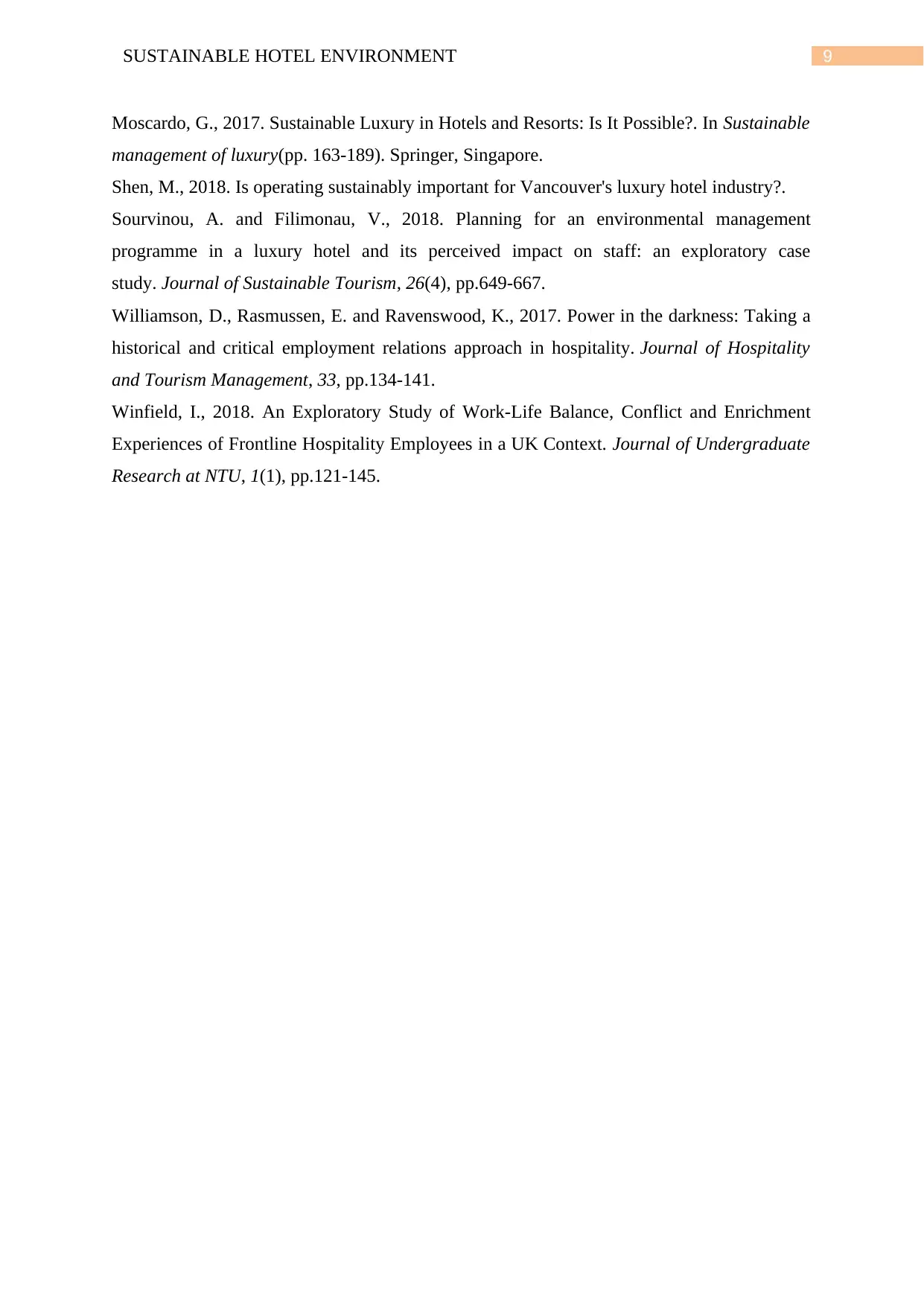
9SUSTAINABLE HOTEL ENVIRONMENT
Moscardo, G., 2017. Sustainable Luxury in Hotels and Resorts: Is It Possible?. In Sustainable
management of luxury(pp. 163-189). Springer, Singapore.
Shen, M., 2018. Is operating sustainably important for Vancouver's luxury hotel industry?.
Sourvinou, A. and Filimonau, V., 2018. Planning for an environmental management
programme in a luxury hotel and its perceived impact on staff: an exploratory case
study. Journal of Sustainable Tourism, 26(4), pp.649-667.
Williamson, D., Rasmussen, E. and Ravenswood, K., 2017. Power in the darkness: Taking a
historical and critical employment relations approach in hospitality. Journal of Hospitality
and Tourism Management, 33, pp.134-141.
Winfield, I., 2018. An Exploratory Study of Work-Life Balance, Conflict and Enrichment
Experiences of Frontline Hospitality Employees in a UK Context. Journal of Undergraduate
Research at NTU, 1(1), pp.121-145.
Moscardo, G., 2017. Sustainable Luxury in Hotels and Resorts: Is It Possible?. In Sustainable
management of luxury(pp. 163-189). Springer, Singapore.
Shen, M., 2018. Is operating sustainably important for Vancouver's luxury hotel industry?.
Sourvinou, A. and Filimonau, V., 2018. Planning for an environmental management
programme in a luxury hotel and its perceived impact on staff: an exploratory case
study. Journal of Sustainable Tourism, 26(4), pp.649-667.
Williamson, D., Rasmussen, E. and Ravenswood, K., 2017. Power in the darkness: Taking a
historical and critical employment relations approach in hospitality. Journal of Hospitality
and Tourism Management, 33, pp.134-141.
Winfield, I., 2018. An Exploratory Study of Work-Life Balance, Conflict and Enrichment
Experiences of Frontline Hospitality Employees in a UK Context. Journal of Undergraduate
Research at NTU, 1(1), pp.121-145.
⊘ This is a preview!⊘
Do you want full access?
Subscribe today to unlock all pages.

Trusted by 1+ million students worldwide
1 out of 9
Related Documents
Your All-in-One AI-Powered Toolkit for Academic Success.
+13062052269
info@desklib.com
Available 24*7 on WhatsApp / Email
![[object Object]](/_next/static/media/star-bottom.7253800d.svg)
Unlock your academic potential
Copyright © 2020–2025 A2Z Services. All Rights Reserved. Developed and managed by ZUCOL.





